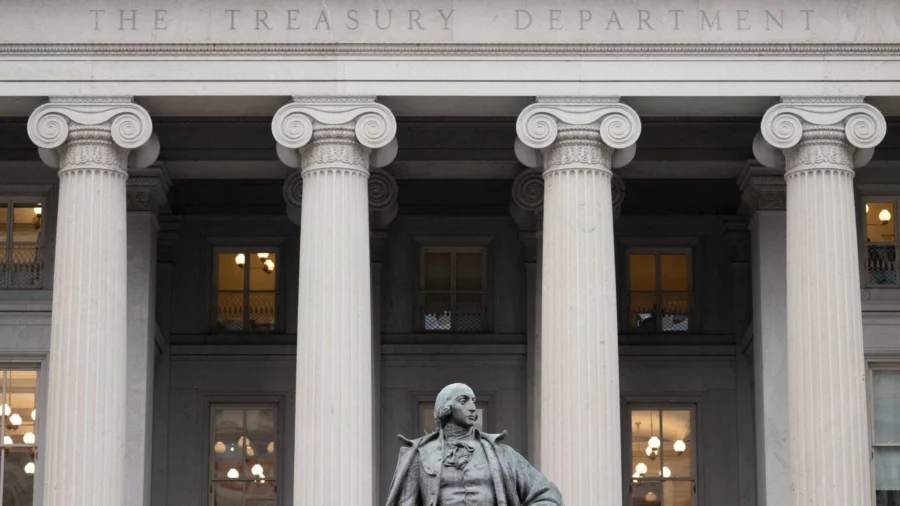Foreign holdings of U.S. Treasury securities extended their decline as China and several other countries reduced their exposure to government debt, new data show.
According to the Treasury Department, global holdings of U.S. bonds slipped 0.5 percent, to $7.565 trillion in October, down from $7.604 trillion in September. This was the second straight month that foreign investors dumped Treasurys. However, compared to the same time a year ago, foreign holdings are up about 6 percent.
China continued cutting its U.S. assets for the eighth consecutive month, totaling $769.6 billion. This is down approximately 1 percent month over month and more than 12 percent year over year.
Japan, the world’s largest holder of U.S. government debt, scooped up nearly $12 billion in bonds in October. In total, Japanese investors own close to $1.1 trillion worth of Treasury securities. Despite the increase, Tokyo’s holdings are down from an all-time high of roughly $1.3 trillion in 2021.
Other nations that added Treasurys to their portfolios include the United Kingdom ($4.1 billion), Ireland ($4.4 billion), France ($4.9 billion), and Canada ($1 billion). On the other hand, the countries which diminished their exposure to the ballooning national debt consisted of Luxembourg ($28.2 billion), Belgium ($32 billion), Switzerland ($4.6 billion), India ($7.1 billion), and Brazil ($3.6 billion).
Overall, foreign investors have not kept up with the soaring national debt, says economist Wolf Richter.
“Foreign holders have not kept up buying the incredibly ballooning U.S. government debt, and, as a result, the share of their holdings has plunged to a share of 22.4 percent, from the range of around 33 percent in 2015,” wrote Mr. Wolf. “In other words, the U.S. debt financing has become less dependent on foreign holders.”
China Pushed to Dump Dollars
The latest data come after a former official of the People’s Bank of China encouraged Beijing to maintain cutting U.S. Treasurys as Washington weaponizes the greenback in international trade.
At Caijing Magazine’s Sanya Forum earlier this month, economist Yu Yongding urged the Chinese government to adjust its overseas assets and liabilities portfolio.
“To this end, China should reduce the proportion of overseas assets in its foreign exchange reserves,” he said, adding that “this kind of thing needs to be done in an orderly manner.”
Mr. Yu noted that the two downgrades of America’s credit rating this year emphasized the deterioration of Washington’s sizable debt problems. At the same time, Chinese officials must refrain from engaging in more extensive sales of U.S. government debt due to the geopolitical implications, he said.
Brad Setser, a former Treasury official and senior fellow at the Council on Foreign Relations, estimates that approximately half of China’s reserves are in dollar bonds.
“The bulk of China’s post-2012 efforts to diversify its reserves have come not from shifting reserves out of the dollar but rather by using what could have been reserves to support the Belt and Road [Initiative] and the outward expansion of Chinese firms,” Mr. Setser wrote in a blog post this past fall.
Economists have posited that Beijing could be selling Treasurys to support the Chinese yuan by using the funds to buy up the currency in global financial markets, artificially raising its value.
The offshore Chinese yuan has tumbled 3.2 percent against the U.S. dollar year to date. The mainland yuan has also slumped about 3.6 percent against the greenback this year.
Domestic Interest in Government Debt
The Treasury Department plans to borrow $1.6 trillion through March 2024. It also borrowed $1.01 trillion in the July–September quarter.
In recent months, there has been growing concern about waning domestic and foreign interest in Treasury securities because of how much is being issued in the financial markets. Recent auctions have suggested conditions are slightly improving.
During the $13 billion sale of 20-year bonds on Dec. 20, primary dealers—financial institutions that purchase Treasurys when direct and indirect investors do not buy them—scooped up 13 percent of supply.
At the $37 billion auction of 10-year bonds on Dec. 11, primary dealers acquired 17 percent of the Treasury supply.
In 2023, the average rate of primary dealers buying U.S. bonds has been 12 percent.
A chorus of experts warn that traders have also become apprehensive about taking on too much risk, especially as the long-term fiscal future of the federal government comes into question. Researchers at Fitch Ratings and Moody’s Investors Service have warned that the current trajectory of America’s finances is unsustainable, justifying this year’s downgrades.

“In the context of higher interest rates, without effective fiscal policy measures to reduce government spending or increase revenues,” the agency said in the November report. “Moody’s expects that the U.S.’s fiscal deficits will remain very large, significantly weakening debt affordability.”
In fiscal year 2023, the U.S. government ran a $2.02 trillion budget deficit, up from the previous estimate of $1.7 trillion. In the first two months of the current fiscal year, Washington’s shortfall is about $381 billion, equal to about $6 billion per day.
“When it comes to budgeting, 2023 has shown us both the good and the bad. We saw the rare moment of success when both sides came together to enact $1.5 trillion in deficit reduction through the Fiscal Responsibility Act—but we also saw the consequences of kicking the can down the road, with multiple funding deadlines and timely budgetary decisions to make in the new year,” said Maya MacGuineas, the president of the Committee for a Responsible Federal Budget, in a statement a statement. “And the longer we allow our debt to worsen, the less room we ultimately have to respond to the kinds of global emergencies we’re seeing in the world today.”
The national debt is close to hitting $34 trillion.
From The Epoch Times

